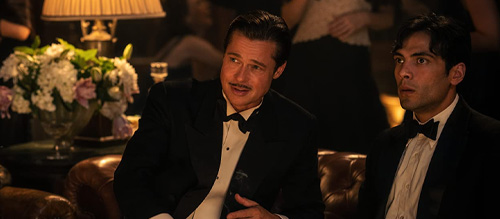Babylon (2022) Review

Babylon (2022)
Director: Damien Chazelle
Screenwriter: Damien Chazelle
Starring: Diego Calva, Margot Robbie, Brad Pitt, Li Jun Li, Jovan Adepo, Jean Smart, Tobey Maguire, Ethan Suplee, Olivia Hamilton, Spike Jonze, Katherine Waterston, Lukas Haas, Rory Scovel, Eric Roberts, Jeff Garlin, Flea
The indulgence and extravagance of Hollywood’s Old West is deconstructed and then re-evaluated in the latest examination of American myth from First Man, La La Land and Whiplash writer-director Damien Chazelle, Babylon (2022); the accurately titled tale of the pre-code era’s dark and debaucherous behind-the-scenes machinations.
All sex, drugs, jazz and human (and animal) excrement, Babylon‘s first act is wide-eyed shock therapy for those indoctrinated by the romantic notion of classic Hollywood and the foundational pieces it put in place to allow cinema to be taken seriously as an art form (or as anything at all). Following a short prologue, the film steamrolls into a lawless party, the guests arriving at the Californian desert home in sand-dusted cars, the men in suits and the women in barely a thing at all. They collect in a large hall, jazz band on stage, people having sex everywhere. It’s a scintillating start, Chazelle and cinematographer Linus Sandgren swinging the camera around as characters are introduced and scenarios arise, pushing in to close-ups on the trumpet player, the nude dancer, the security guard, the assistant. It’s Brian De Palma’s opening to Snake Eyes – fluid filmmaking presenting intricately designed mayhem at a rapid pace – only more brimming with life, with circumstances, with story intent. This is the wildest of the wild west, what happens during a relative gold rush; madness, ecstasy and tragedy side-by-side.
It’s an opening that will divide the weak-stomached from the rest, and is no doubt a sensory overload to those hoping for the romanticism of this director’s L.A.-based musical La La Land, but it really is a filmmaking triumph. Cinematography and musical composition are blended to the direction of the camera and actors and extras and props and visual effects like few other films, and it’s all in service to the purpose of the piece – this is the myth of Hollywood, perhaps the most glamourised version of free market dream palaces, deconstructed nay obliterated by truth. Your perspective of grandiose cinema artistry blown up at the hand of the very methods you champion.
It is during the party that we are introduced to Brad Pitt’s superstar studio-heading silent-era actor Jack Conrad, a Clark Gable, Cary Grant, Gene Kelly-alike with quite possibly a drinking problem; Margot Robbie as Nellie LaRoy (“Roy” meaning Sun in French, “the “La” for effect”), a nobody who knows she’s a star before she has even had a job, a hot-head from the wrong side of the tracks; and, Diego Calva as Manny Torres, a Mexican immigrant to California doing any job necessary to make it onto the Hollywood movie sets. These are Babylon’s key players, the cruxes of the the narrative, and they each represent the lavishness of cinema’s silent era and the challenges (and restrictions) imposed by the coming era of sound.
Diego Calva’s Manny is the character around whom the film is structured, and his is a performance that is able to flourish in transition as the film unravels with highlights from the coming years, his wide-eyed anything goes attitude replaced with a stiffness, a shortness of temper, a desperate pressure cooker-like personality. He is the everyone, the nobody, the man with a dream, and thus more easy to identify with than his co-stars, but Margot Robbie and Brad Pitt are offering some of the most exceptional work of their careers here; Pitt is particularly lovable and tragic at the same time, his performance laced with a great sadness that Chazelle utilises with some cleverly constructed moments of filmmaking intimacy (extreme close-ups, score-less dialogue, the use of monologues to transition from period to period or from meaning to meaning). These three stars, supported by a plethora of recognisable faces with mostly interesting character arcs and narrative dynamics, are as large and interesting as the stars we glamourise from the eras long since passed; they are utterly unmissable.

For as much as the superstar headliners have their say, the success of this complicated but tremendously balanced and intricately constructed (at every level of filmmaking) piece of cinema must be owed to writer-director Damien Chazelle. This isn’t a history book, it’s far removed from a recounting of a monumental period, it’s a film unto itself – a reflective piece that uses the myth of old Hollywood as the foundation of its commentary and, like greats such as Terrence Malick have done before him, expands into self-reflection, current-era commentary, and the foundational aspects of journalism, law, etc. that uphold the studio system. It’s a magnificent swing at the established order, but not because of how it was once all drink, drugs, sex and overdoses, but almost because of the opposite…
In Babylon, Chazelle makes it very clear that the homogenisation of the studio system into the realm of big business and old money was a poison that defecated upon the very principles of cinema as the people’s art form, as the entertainment factory. As the drug-fuelled parties fade into the past, as the makeup is washed away and voices come into play, we see not only a reduction in the fluidity of the filmmaking and a transition in power dynamics within the film sets, but we see increased power for the money men, even witnessing the coming of the Rothschild family. One scene, in which we see our characters revisit their party days at a new-era studio party, our protagonists are left tapping their feet, pretending to be somebody they’re not. Chazelle cuts from their monotonous conversations to close-ups of untoward happenings (such as a man’s hand placed on the hip of a woman who is not his wife), and we are forced to accept how the almost-honest approach of “everything is for everyone and anyone can make it here” of the opening party’s ‘drugs for free, sex available’ stance has been replaced by debauchery of another level, a less honest and insidious level that comes to be personified by the big-money gross psychopath James McKay, played with a brilliant lack of humanity by Tobey Maguire. His brief role is one that introduces us to the dark underbelly of the old-money new era of cinema, and it’s like an 18-plus journey through Willy Wonka’s horrifying tunnel. Post silent-era Hollywood isn’t a place for dreamers, it’s Babylonia of a different kind, one exploited by the rich for the rich, dreams eaten whole and regurgitated from within, just as the very existence of Babylon is of testament to.
Cinema has undergone a particularly self-reflective period in the post-9/11, “nobody watches the Oscars”, make everything a universe/franchise/sequel, era. Filmmakers like Paul Thomas Anderson have made movies with loose metaphors about the director’s struggles under the watchful eye of increasingly cautious studios, whilst the likes of Joanna Hogg and Steven Spielberg have presented more direct pieces of self-reflection. Damien Chazelle’s latest work is of the latter category, a film from within the system seeking to re-evaluate the system itself. Like Classic Hollywood it is beautiful to look at, like the contemporary blockbuster it is rapidly paced, like all of the director’s work it is presented at a very exact tempo to which the score is (beautiful and) vital, and the larger than life ensemble reflect the studio system’s for-better-or-worse reinforcing of celebrity culture. This is cinema’s foundations, its history, and its present all at once, a movie for our time and of great reflection on a time long gone.
Filmmakers are dreamers, all of us who watch and write and think about film are dreamers. This dream factory, which touches the lives of more people than anything else, is a powerful tool of creativity and empathy, and a home for so many people. Cinema of course moved on once sound was introduced, and we will never be absent of understanding the impact of silent era filmmakers, but we must attempt to understand whose hands are shaping cinema’s future just as Babylon ensures we bear witness to those who shaped its past. Great art will always exist, and even in the multi-billion dollar industry of Hollywood it shall always persist, but in the face of streaming and the apparent decline of the theatrical experience, films like Babylon serve as a warning. Jean Smart’s Elinor St. John says in the film that in 100 years, when we are all gone, people will still watch movies, those who made them simply angels and ghosts – for the sake of cinema, we should all hope that this will be the case.
Babylon is intelligent, moving cinema disguised as a celebration of the raucous and debaucherous, a filmmaking triumph from one of the era’s great American filmmakers; an unmissable big screen experience that offers everything you could ask for and more; an (almost) instant classic.
Score: 22/24

